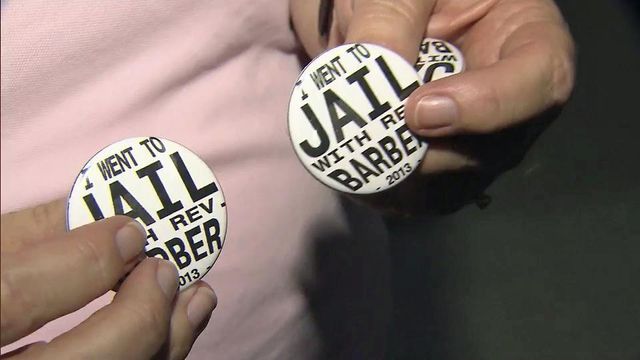'Moral Mondays' forcing changes in Wake arrest procedures
The high volume of arrests at Moral Monday protests at the North Carolina State Legislative Building has changed how protesters violating misdemeanor trespassing laws are being handled once they are arrested - changes that are raising the brow of at least one conservative group.
Posted — UpdatedSince April 29, more than 600 people, including 120 this week, have been arrested while speaking out against Republican-backed policies and legislation that they believe disproportionately hurt the poor and minorities.
Generally, after a person is arrested in Wake County, he or she is taken to the City-County Bureau of Identification – a county law enforcement agency that, among its many responsibilities, books, fingerprints and photographs alleged offenders before they go before a magistrate.
Sam Pennica, director of CCBI, says that, beginning with last week's arrests, protesters bypass being fingerprinted and photographed to help cut costs incurred by the influx of people being taken into custody.
As the number of protesters grows, he says, so does the number of staff needed to process them, as well as arrestees from the county's other law enforcement agencies, including the sheriff's office and police departments for all Wake County municipalities.
CCBI agents also collect and analyze evidence at crime scenes, and with limited funding for overtime, Pennica says he has to weigh how to best use that funding.
"It's a matter of dollars and cents and how much money I have to operate CCBI and whether I spend that money on fingerprinting and photographing someone who's arrested for trespassing, or do I pay an investigator overtime to work a homicide?" he said. "Those are the decisions we have to make."
Civitas, which describes itself as "North Carolina's conservative voice," is known for its polling and policy reports relevant to topics before the General Assembly. It has been posting details of Moral Mondays arrests, including mug shots, employer information and salaries, to its website.
"We've requested that actual information, and as of right now, I'm not so sure it's a real resource question," DeLuca said. "In terms of what we've seen from our actual requests, it's not a huge burden."
He says he is also concerned that protesters are now being handled differently when they're arrested.
"Now, they're being processed through the clerk of court, which is basically filling out a form and then being released. They get a court date and aren't getting fingerprinted or mug shots," DeLuca said. "I kind of equate it to fishing. It's like catch and release. You catch a fish and throw it back into the water."
But he says he hesitates to say if politics are playing a part in the recent change. "There's a bunch of different agencies, so you don't know exactly where to put the finger and say, 'This is the person making this decision.'"
Wake County District Attorney Colon Willoughby says the move has nothing to do with politics but rather how to efficiently run CCBI and get cases through the justice system.
"We have limited court resources that we're trying to properly allocate and be good stewards, and (the Moral Monday arrests) are putting a severe burden on (the resources), and I'm trying to figure out how to deal with it."
If every person charged so far in the Moral Monday protests were to want a trial, Willoughby says he estimates it would take an entire year for a District judge to hear and rule on the cases.
"It's a tremendous amount of resources when we're struggling to try to get drunken-driving cases and domestic violence cases and violent juveniles processed through the District Court," he said. "It's a tremendous imposition on them, and it's being felt only by Wake County. The other 99 counties don't bear this burden."
He says he hasn't ruled out having to ask the General Assembly to appropriate more funding to handle the cases.
"If they think it's important, then they certainly ought to be willing to back that feeling up with the resources for us to prosecute these cases," Willoughby said. "If they don't think it's important, then that's certainly a signal to me of how I ought to view these cases."
As for the changes in processing arrestees, Willoughby says that state law allows law enforcement agencies to use discretion as to whether to fingerprint and photograph people charged with misdemeanor crimes.
Every person arrested, however, must still go before a magistrate and still has a criminal background check to see if they are wanted on other offenses.
Willoughby says he initially proposed citing the Moral Monday protesters instead of arresting them but that General Assembly Police Chief Jeff Weaver rejected the idea.
Weaver says citations would not be effective.
"The problem is, if they won't leave when we ask them to, then us trying to issue them a citation on the spot is not much of an alternative," Weaver said.
"We've tried to figure out all the alternatives," he added. "Other than the fact of what we're doing now, we don't see any."
• Credits
Copyright 2024 by Capitol Broadcasting Company. All rights reserved. This material may not be published, broadcast, rewritten or redistributed.






